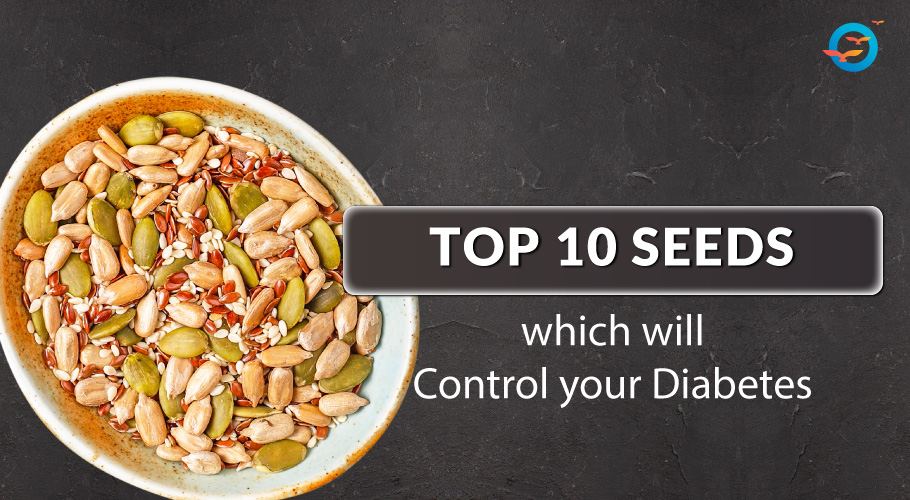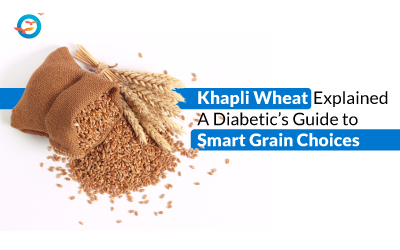Seeds for Diabetes

The most commonly used food items are grains, vegetables, fruits, and animal products. All of us will agree that seeds fall into a much neglected and underused category. But it should not be so. Actually they are a "powerhouse" of lots of vitamins, minerals, and antioxidants and should be included in the daily dietary regimes. In this article, we will discuss some of the best seeds for diabetes patients.
Here is a list of the top 10 seeds for diabetes patients extremely useful for good health
Seeds for diabetes control
1. Fenugreek seeds Benefits
Fenugreek also known as Methi has multitudinous benefits. They can also be referred to as boons for diabetes Patients due to their unique properties.
The soluble fiber present in Fenugreek helps in reducing the absorption of glucose and in turn, helps in controlling glucose levels.
The higher dosages of fenugreek show a more hypoglycemic effect.
2. Sesame seeds Benefits:
We already know seeds are a powerhouse of nutrients. Diabetes patients are often advised to eat only healthy food and hence it is advisable to include it in their diet.
If you carefully go through the benefits of sesame you will understand that they are very much helpful in conditions leading to diabetes. They help in maintaining blood pressure due to their magnesium, help reduce inflammation, have antioxidants to combat oxidative stress, and their quality of being high in protein and healthy fats makes them special.
3. Kalonji seeds Benefits:
Kalonji whose scientific name is Nigella sativa is also called black cumin or nigella. Roman coriander, black caraway, fennel flower, and nutmeg flower are their English names. Kalonji is used as a spice that gives a nice aroma to food.
- Kalonji are also referred to as 'Miracle Seeds"
- Kalonji is famous for its medicinal properties as it helps in diabetes, heart issues, hypertension, weight loss, etc.
4. Watermelon Seeds Benefits:
Watermelon is a fruit that we relish during summertime or we can also say it is a summertime favorite. The edible part is sweet and juicy red with black seeds. We mostly tend to neglect the seeds and eat the flesh.
But did you know these are edible and have many health benefits?
- It contains magnesium, iron, zinc, and uniquely 'good fats' in.
- They are low in calories and can be a great replacement for any unhealthy snack.
5. Jackfruit seeds Benefits:
Jackfruit is a unique kind of fruit with green-colored skin, yellow flesh, and whitish-yellow seeds. The yellow flesh that is sweet and tasty is the edible part
Is jackfruit seed good for diabetics?
Yes!
The qualities of jackfruit like their role in reducing inflammation, richness in antioxidants, and the existence of soluble fiber all are helpful in diabetes.
6. Sunflower Seeds Benefits:

Sunflower seeds are obtained from the big flower heads of the plant. The edible seed variety has a nutty and mild flavor.
To summarize, these are a great crunchy and nutty snack that are packed with plant compounds and various nutrients. These nutrients largely help one fight type 2 diabetes, heart disease, and inflammation.
7. Sabja Seeds Benefits:
'Sabja seeds' is a very commonly heard term in relation to food items like Falooda, Sherbet, milkshakes, etc. Its slimy texture and tininess are the first things that come to our mind and their addition makes us feel happy.
- It is commonly used to come from sweet basil, Ocimum basilicum. These are black in color and also resemble chia seeds. The other name of sabja is tukmaria.
- The Sabja contains an abundant amount of fiber and provides surprising health benefits in the area of weight loss, relieving constipation, diabetes, etc.
8. Flax Seeds Benefits:
Flaxseeds are golden yellow to reddish-brown seeds of flax.
- Its health benefits are mainly attributed to the omega-3 fatty acids, lignans, and fiber they contain. High fiber content is responsible for reducing cholesterol levels and improving heart health.
- They are not only a great source of plant-based protein but also help diabetics by lowering sugar due to the insoluble fiber present in them.
9. Chia Seeds :
Chia seeds are small seeds black in color obtained from the plant Salvia hispanica. It is an important food due to its ability to provide sustainable energy.
These are loaded with antioxidants, have good quality protein, and help in reducing blood sugars and inflammation in the body.
10. Pumpkin Seeds Benefits:

Pumpkin seeds are a rich source of iron, magnesium, antioxidants, zinc, and many other nutrients that help in maintaining good heart health. These are heart-healthy, blood pressure healthy, and also helpful in type 2 diabetes.
Thus, You MUST HAVE it in your regular diet.
| Also, Read Top 10 diabetes-Friendly Fruits
FAQs
1. Which seeds are best for managing diabetes?
Fenugreek seeds, Sesame seeds, Kalonji seeds, Watermelon Seeds, Jackfruit seeds, Sunflower Seeds, Sabja Seeds, Flax Seeds, Chia Seeds, Pumpkin Seeds.
2. How do flaxseeds help in controlling blood sugar?
Flaxseeds are high in fiber, especially soluble fiber, which helps lower cholesterol levels by slowing down digestion and the absorption of sugar into the bloodstream.
3. Can chia seeds lower blood sugar levels?
Yes, chia seeds can help lower blood sugar levels. They are loaded with antioxidants, have good quality protein, and help in reducing blood sugars and inflammation in the body.
4. Is it safe for diabetics to consume sunflower seeds?
Yes! Sunflower seeds are a diabetic-friendly snack, rich in nutrients like magnesium and fiber. They help regulate blood sugar levels and support overall heart health.
5. What is the role of fenugreek seeds in diabetes management?
Fenugreek seeds are rich in soluble fiber, which slows digestion. They also contain an amino acid (4-OH Ile) that boosts insulin release, helping to control blood sugar levels.
6. Can pumpkin seeds help in preventing blood sugar spikes?
Yes, pumpkin seeds can help prevent blood sugar spikes due to their fiber, magnesium, healthy fats, and antioxidants.









